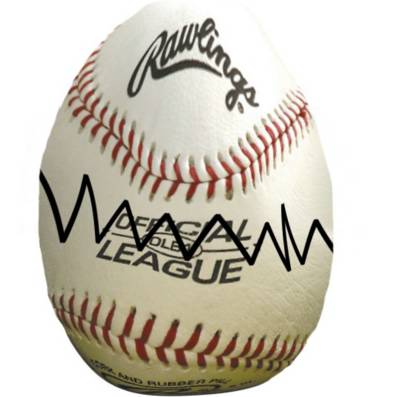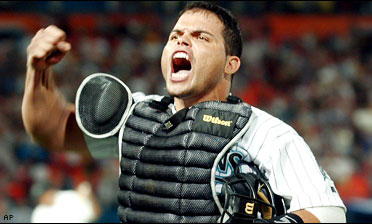Yesterday the Houston Astros, currently in fifth place in the 6-team NL Central, 10.5 games out of first place and 4.5 off the Wild-Card leading SF Giants, canned their manager, Jimy Williams. WIlliams had been with the Astros since the beginning of 2002, and had managed the team to consecutive second-place finishes, but was mired in struggle to stay above .500 this season, and lost some of his credibility for some of his managerial and public relations decisions.
A manager like Williams, whose trademark is his ability to relate to and teach young players, seems an odd fit for a veteran-heavy team like the 'Stros. For that matter, he seemed an odd fit for the veteran-heavy Boston Red Sox team he helmed for five years before he went to Houston, but he was good enough as long as they were winning. In Boston, too, you should recall, he lost his repoire with and the respect of the players and was eventually ousted in mid-August of 2001. Despite a 65-53 record at the time, they brought in Joe Kerrigan, who promptly ran the ship aground, plummeting the Sawx into a 17-23 spiral for the rest of the season.
Though Williams has only once manages an entire season and finished with a losing record(1997, before the Red Sox had any pitching), he has never finished better than second place in any full season he managed either. I don't know how much that means, exactly, since the five years he spent with the Red Sox happened to coincide with the Yankees' run of division titles and playoff appearances, and if the current divisional format were in place in the 1980's, his 96-66 record in 1987 would have won the AL East. But it's at least interesting to note that the Astros brought in a guy who had a history of underachieving and then fired him when he underachieved.
Williams' replacement, Phil Garner, doesn't fit the usual mold they use when replacing a manager. Typically, a feisty manager is replaced with a more low-key guy (Bobby Valentine out, Art Howe in), or a strict rules type is replaced by a laid-back, Go-Do-Your-Job type (Buck Showalter out, Joe Torre in), or a "players' manager" is replaced by more of a disciplinarian (Lou Piniella for Hal McRae). In this case, both Garner and Williams have the reputation of no-nonsense, down-to-earth, players' managers, except that one is six years younger than the other, and had a significant part of his playing career occur in Houston. Why that should matter, you've got me.
In the meantime, there are reasons for the Astros' disappointing season other than Williams' perceived failure(s). Andy Pettitte is collecting ten or eleven million dollars (half of it deferred) from the Astros this year, and has spent half of it on the DL. He's made only ten starts, and did not pitch more than six innings in any of them until July 9th. Wade Miller has been and is again injured, and will probably need rotator cuff surgery after the season, if not sooner. Tim Redding has been a study in contrast, putting up a 6.07 ERA(!) so far this year after the 3.68 he compiled in 2003, which led all qualified Houston pitchers and was 15th in the NL. Pete Munro and Brandon Duckworth are hardly picking up the slack.
ESPN's Jerry Crasnick wrote that Roy Oswalt has been a disappointment, but disappointment depends on expectations, does it not? Oswalt is only 8-7, but his 3.65 ERA is actually pretty good, and he's got 13 quality starts to his credit. The trouble is that the Astros have lost six of those 13 games, with either the hitters or the bullpen, or both, letting Oswalt down. After three seasons in which he had an aggregate 2.92 ERA, 3.65 may seem a little high, but lots of managers would love to have a guy as "disappointing" as Oswalt is right now.
Unfortunately, there are enough guys like Redding and Pettitte to offset the Roger Clemens and Roy Oswalts, making the team's pitching staff mediocre overall. The Starters are mediocre, the bullpen's mediocre, that's just the way it's been. Now, if some of that is due to injuries and those injuries subside, or if Tim Redding figures out what's wrong with him, then the pitchers are right back on track.
Sadly though, the hitting is also mediocre. The Astros rank 8th in runs scored in the 16-tema NL, and 9th in ERA. Jeff Bagweel may be a Hall of Famer, but right now he's hitting .268, with fewer homers, fewer RBI and a lower OPS than Casey Blake. Morgan Ensberg, the darling of fantasy players everywhere last season with 25 homers in under 400 at-bats, needs to call Pat Robertson to join the 700-Club, because his OPS won't get him there. Craig Biggio's been decent, but Adam Everett and Brad Ausmus have been, well...Adam Everett and Brad Ausmus, so they're not much help either, on offense, anyway. Richard Hidalgo stank up the joint before getting taded to the Mets, where he somehow suddenly remembered how to hit like he did in 2000, a supposed breakout performance that got him a couple of points in the MVP voting (would have been more if the Astros hadn't finished in 4th place that year) and his likeness on the cover of BP 2001.

As I mentioned, however, he's now doing that for the Mets, so that's not helping either. The recently acquired Carlos Beltran is quite talented, but he can't do it alone, and Scrap Iron can't go out there and score more runs for them, so they either need Bagwell and his pals to start hitting like they're capable of hitting, and for the pitchers to get and stay healthy and effective, or they'll be lucky to finish the season with the .500 record they have now, much less winning the division.
This Astros team, it seems to me, has had a history of chewing up managers and spitting them out, scapegoating whomever is convenient, in spite of any evidence that failure wasn't their fault. Art Howe managed the team from 1989-1993, taking them from being a decent, 86-win, 3rd place team to a 97 loss team and back to third place in those five years.
That tumultuous ride ended after Howe had guided them back to respectability, and they brought in Terry Collins. Collins had never managed in the majors previously, but had the Astros in a near-tie for the NL-Central division when the strike hit in 1994, and he guided the team to second place finishes in 1995 and '96 as well.
Collins was replaced in 1997 by Larry Dierker, long-time pitcher and broadcaster for the Astros, but also new to managing, who led the Houston franchise to four division titles in five years. (The one blemish on his record was 2000, when the pitching all fell apart and the Astros had the worst ERA in the NL, the first time since 1993, when Colorado joined the NL, that a team that was trying to win finished below the Rockies in ERA. Florida had done it in 1998, but that hardly counts.)
The knock on Dierker, though, was that he somehow couldn't get it done in the clutch, because the Astros were eliminated in the NLDS all four of those years. Of course, nobody bothers to mention that three of those four times, the Astros had to face the Atlanta Braves' pitching, which has beaten a lot of teams in the playoffs over the past decade or so. So Dierker was ousted as well, with "Non-Clutch" stamped on his forehead and a "Kick Me" sign placed on his back by the players. Brad Ausmus and Bagwell and Biggio and probably others all had detrimental things to say about Dierker before and after he left, but the numbers speak for themselves, and his .553 career winning percentage in over 800 games should have said more than his 2-12 record in fourteen games spread out over 5 years.
They've scored 396 runs and allowed 379, so their record is right where it should be, according to Pythagoras, at least. The Astros aren't losing games they ought to win, they're losing games they were expected to win. Once again, the manager is taken out and shot to set an example, and to appease players who aren't doing their jobs well, and to scapegoat a front office that's spending millions of dollars on aging, underproductive players who need to win now, while they still have a career.
For his part, I have a hard time imagining that Garner will make much of a difference. He's never finished higher than 2nd place either, and that was 12 years ago, his only season above .500. Of course, he had to manage the Brewers and the Tigers before, so it's hard to blame him. Nevertheless, if the Astros don't at least win the Wild Card (the division, 10.5 games away, is clearly out of reach), blame him is exactly what they're likely to do. But should they? Since the inception of the three-division, Wild-Card format, only four of the 18 Wild-Card winners were as many as 4.5 games out at the All-Star Break, which is exactly where the Astros currently sit:
Year AL WC GB NL WC GB
1995 Yankees 7.5 Rockies 0
1996 Orioles 3.0 Dodgers 0
1997 Yankees 0 Marlins 0
1998 Red Sox 0 Cubs 3.0
1999 Red Sox 0 Mets 0
2000 Mariners 0 Mets 0
2001 Athletics 7.0 Cardinals 5.5
2002 Angels 0 Giants 2.0
2003 Red Sox 0 Marlins 4.5
Most of those teams that actually won the WC were already either leading the Wild Card race or theor own division at the Break, and it took tremendous second-half runs by the 2001 A's, the 1995 Yankees and the 2001 Cardinals to get into the playoffs. With that said, the Astros have all the elements in place for such a run: Underperforming talent, first-half injuries, and a new manager, all of which played into one or more of those second-half surges that got those teams into the playoffs.
If nothing more, it will be interesting to watch what happens.

















 The clock is ticking...
The clock is ticking...


 New York City Baseball: The Last Golden Age, 1947-1957
New York City Baseball: The Last Golden Age, 1947-1957



